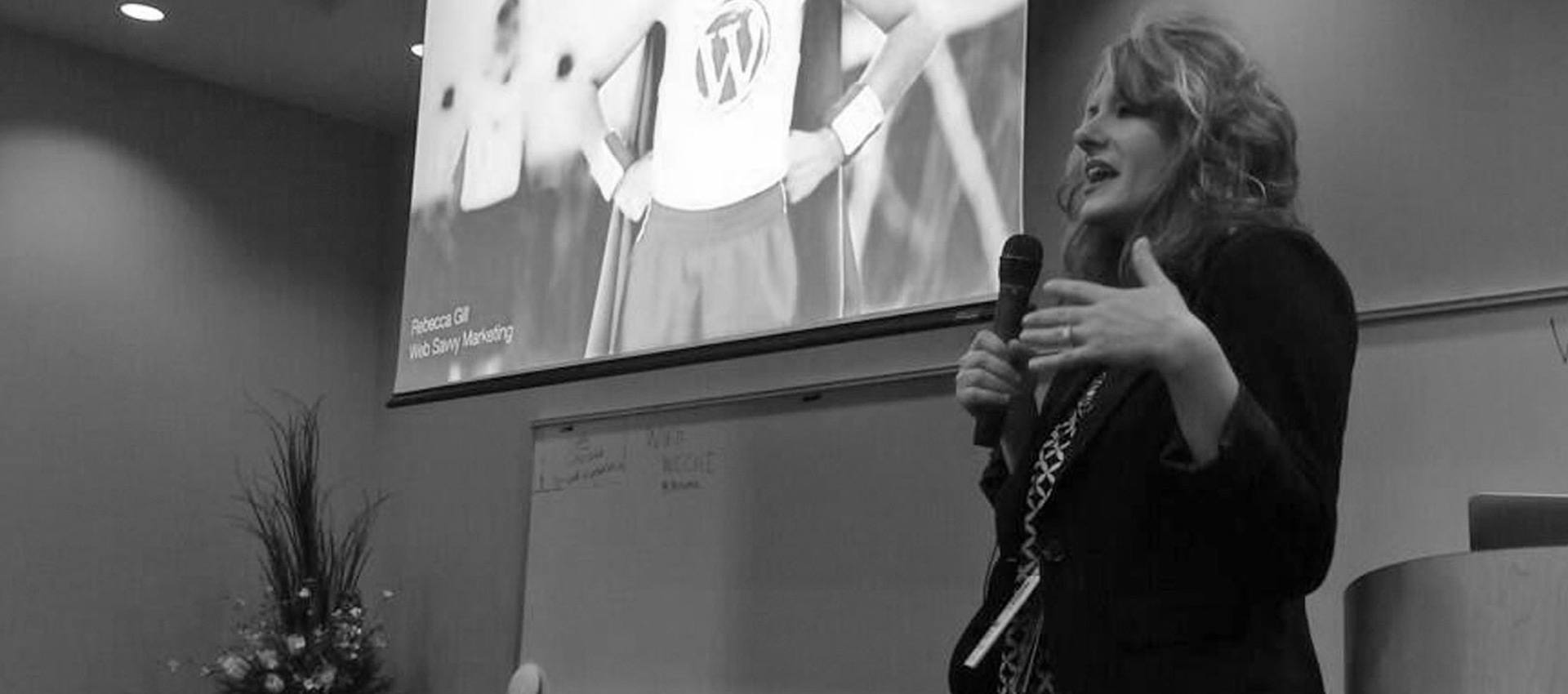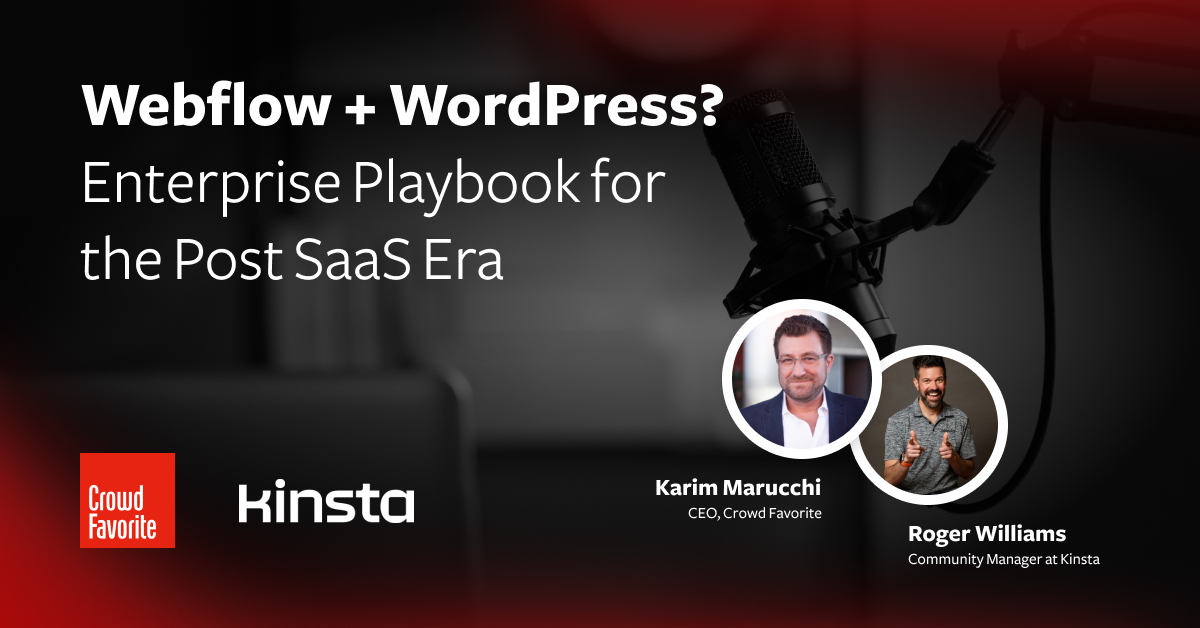Discussing Digital Trends and Techniques with Enterprise SEO Expert Rebecca Gill
The rules of SEO are constantly evolving. With the modern digital landscape moving at breakneck speed, business organizations need to act quickly in order to develop a strategic roadmap and take the sort of calculated risks that will land them on the first page of Google’s search engine results. While this notion is true for all organizations, it’s especially valid for the enterprise, which comes with its own unique set of challenges and advantages.
Today, I sit down with leading SEO specialist Rebecca Gil of Web Savvy Marketing to discuss the SEO trends that are set to shape 2018 and beyond. We talk about big-picture concepts, like ways for enterprise organizations to streamline their SEO focus in a fragmented landscape, why it’s important to build robust, long-term sites with strong code, and the ways Google is changing its approach to indexing information (and ultimately becoming smarter).
We also go on discuss the specifics behind concepts like technical SEO, the rise of mobile-first indexing and what is now becoming semantic search, and take a look at emerging models like the Knowledge Graph, an intelligent graph that was introduced to Google’s search engine in 2012 and has recently entered the mainstream. Ultimately, though, we tell you the ways that staying ahead of the SEO curve can ensure future success for the enterprise.
You have to have an SEO champion and that’s not somebody who is at a lower level within at that organization. It’s somebody higher up in the organization who truly understands the value of SEO and the importance it has on the enterprise as a whole.
Rebecca Gill, SEO Expert
Like what you’re hearing? Share this vlog on Twitter.
[bctt tweet=”You don’t necessarily have to jump on shifting #SEO trends immediately, but you need to be cognizant of the activity around you and then make a calculated decision on how fast you have to adopt it. @rebeccagill” via=”no”]
At Crowd Favorite, we’ve engineered digital solutions for some of the world’s largest multilevel organizations. As authorities in the enterprise space, we’ve compiled some of our knowledge gleaned over the past 15-plus years in a series of blog posts to help our clients and other developers achieve success. If you’re interested in learning more about best practices for the enterprise in the digital realm, check out our recent blog posts.
Takeaways from This Conversation about Enterprise SEO
- Identify a senior SEO champion. Working with an SEO champion at a higher level within your organization will set the direction for internal and external resources and streamline points of focus in an otherwise fragmented enterprise.
- SEO concepts to know now: Semantic search, the Knowledge Graph, schema and structured data, mobile-first indexing, AMP adoption.
- Mobile is no longer an afterthought. 20% of all searches today are conducted via voice search, and that percentage is on the rise. For enterprise organizations to provide answers for these complex questions, they must ensure that any mobile websites – not just desktop websites – are well-architected and executed.
- Technical SEO is growing in both requirements and importance. It’s therefore vital to keep technical SEO in mind at every level of enterprise websites, from graphic design, to the buildout process of the site’s code base and content, to audits pre- and post-launch, and also during health checkups a year or more later.
- Own your data to stay in control of your digital destiny. Concerns about digital ownership policies, such as with Google Analytics, are valid. Putting your data in the hands of a third party can skew the efforts you’ve made, and the enterprise should therefore retain ownership of as much of their digital content as possible.
SEO Considerations for the Enterprise
Video Transcript
| Karim: |
Rebecca Gill, welcome. Thank you for joining me. |
| Rebecca: | Thanks for inviting me on. |
| Karim: |
One of the things we have in common, Rebecca, is we’ve both been working with larger enterprise and larger companies for the last 15 to 20 years. What kind of changes and trends have you seen, and how is your experience in working so long in this space directly helping your clients? |
| Rebecca: | The one thing I will tell you as a takeaway that is the most valuable that I’ve experienced that I’ve had and the most valuable takeaway is in a lot of cases, the enterprise is fragmented. There’s a lot of people moving and changing and planning and updating and executing, and there isn’t a cohesiveness to that SEO strategy and plan. When that’s in place, there are holes. There are gaps, and your SEO starts to fall apart |
| When I first started doing SEO 15 years ago, I was a small business and I was competing against enterprise-level websites, and the reason I could beat them was they lacked strategy and they lacked execution tied to that strategy, because there were multiple departments and multiple people. And when you looked at their SEO from the outside, you could see that. There wasn’t that cohesive plan that was needed. | |
| That’s definitely both, it’s a challenge for the enterprise but then it’s also an opportunity for anyone who competes against enterprise-level websites, because you can be much more structured, much more cohesive again, making SEO an enterprise-level effort and making sure that everybody is working together in harmony towards a single point of focus and a single pursuit. | |
| Karim: |
Yes, we do see enterprise clients. So, sometimes if business units or different departments don’t plan well together, you end up with a fragmented SEO strategy. Do you have any advice for our clients on what they can do to prepare for working with an SEO consultant? |
| Rebecca: | Without question, I would tell you to have an SEO champion and that’s not somebody who is at a lower level within at that organization. It’s somebody higher up in the organization who truly understands the value of SEO and the importance it has on the enterprise as a whole, and making sure that that message is communicated to everybody that’s involved. |
| It’s just like any project in the enterprise. If you have a champion who really believes in what is being done and understands the ramifications it has in the enterprise and the long-term viability of the organization, that speaks volumes. That sets the direction for both internal and external resources and it really helps make the entire process a success. | |
| Karim: |
Sometimes, we have clients who are willing to really be on the cutting-edge of technologies and sometimes, they have to be bomb-proof and make sure that they’re doing things that have only been proven out there. In how you’re seeing the SEO market change, and how quickly it changes, can the enterprise afford to “wait and see,” or do they have to stay right on top of all these changes that happen to actually have effective SEO? |
| Rebecca: | Great question. I think with SEO, you really have to always be aware of what’s changing and the trends and the shifts that are occurring. You don’t necessarily have to jump on them immediately but you need to be well-aware, be cognizant of the activity around you and then make a calculated decision and how fast you have to adopt it. |
| You can’t sit back and wait. You can’t wait for an SEO book to come out to give you that roadmap, because by the time that book goes to publish and you actually can get a physical copy of it, the information has changed with SEO. SEO is constantly moving, and the enterprise has to keep that in mind because they have to be moving along with it and again, taking calculated risk but making sure those risks are mitigated and within a parameter that’s acceptable, because you can’t wait for everything to be safe to be able to move forward. You’ll be left behind, and you’ll be page 10 of Google if that happens. | |
| Karim: |
What are the things that are unique when we talk about finding the right strategy for SEO in the enterprise? |
| Rebecca: | I think when we used to look at SEO in the past, there were bits and pieces that people would focus on. We have grown up with SEO thinking it’s primarily about content and links and that’s the core of the internet, which it still is, but modern SEO has become a building-block approach of technology and really some advanced topics that go into making SEO successful whether it’d be small business or the enterprise. |
| As we move forward in 2018, some of these are becoming even more and more prevalent and very necessary for the enterprise groups and organizations to really understand what they are and how they apply to their marketing strategy. These include things like semantic search and the Knowledge Graph and schema and structured data. Mobile-first indexing is coming in just a few weeks. You’ve got AMP adoption then like technical SEO has become super important, and you can’t get away with this. Especially when you’re looking at those large websites that have aged and multiple people are interacting within the content and the code. | |
| Karim: |
Right, that’s a lot. We break that down, I could imagine one of the advantages that enterprise clients have in SEOs. They have a lot of resources to throw at this? |
| Rebecca: | Yes. |
| Karim: |
How would you break down that strategy? What’s the first thing to focus on? |
| Rebecca: | I think the first thing is understanding the components that go into modern SEO and then having a good understanding of who they apply to. For example, if you just look at semantic search. Semantic search would directly impact the content marketers within the organization. It’s going to affect the SEO people who might be doing the actual optimization, the strategy and the planning. But the content writers and those marketers that are responsible for that actual content, they need to be aware of what it is, because, traditionally, they’ve been taught to look at things like keyword density, which no longer really applies in SEO. |
| Now, Google is a lot smarter and it’s looking for things in regards to the relationship and user intent on how a human’s user intent actually relates to the content that’s being written. It no longer cares about keyword density. It needs keywords to have a good understanding of where things are and have a strong idea of the topic involved but there’s a lot more elements that go into that content and that optimization that replaced that density. It’s things like the synonyms and the words that you use around the content. It’s what’s happening in the current day trends. | |
| Just for an example, if there was a movie that was coming out that was called Grounded. If you did a search for the phrase or the term Grounded, three months before that movie arrived, Google would give you results about being grounded like to the dirt, to the ground. If the movie just arrived out and it’s being talked about in the internet and social media and people are searching for it, Google is going to immediately think when a search is done for that that the user and the intent is based on the movie. It uses current trends. | |
| It also looks at the search you did just before the current search and if it’s confused, it’s going to look at the content within that article itself or that URL to try to help better figure out what the nature of that content is and apply it to search. It’s just a different way of thinking about keyword strategy and about how that content is actually written, the depths of that content and how you really want to present it. |
| Karim: |
What’s the difference between the old keyword strategy of really focusing on keywords, and what’s becoming semantic search? |
| Rebecca: | Yeah. So, 10 years ago we would look for one-word or maybe two-word phrases to target for keywords and target for content and we would map that to specific pieces of information on our website. We still do that today, but we need to look at that at a more expanded level. Longer tail keyword phrases are much more important because of voice search. People are using it. They’re searching with the voice as opposed to typing, so, by the nature of that process, the phrases are getting longer. |
| Google is much more intelligent and can give much better results for longer phrases, so people are using them more and more. That just changes right there, the type of keywords that you may select and that you might want to put as a focus within your plan and strategy. Then, when you are going to write that content, Google is smart enough now to know that things like ‘small,’ ‘tiny,’ ‘miniature’ and minor are all really the same thing. | |
| You wouldn’t create an individual piece of content for ‘tiny house’ and then a different one for ‘small house’ because to Google, in today’s environment, they’re the same thing and it’s going to interchange those search inquiries and produce the same piece of content. It’s just much smarter in how it handles that information, and it’s relying on the writer to truly do a good job and cover and entire topic and make sure that there’s enough information in there so they can utilize it properly in search. It’s just very different than what we would have done five years ago or 10 years ago or even two years ago. | |
| Karim: |
You mentioned the Knowledge Graph. Can you tell us how that affects us? |
| Rebecca: | Certainly. So, the Knowledge Graph was first introduced in 2012, and while it has been getting used since then, it hasn’t really become mainstream until recently. Now, every time you do a search in Google, the chances of having some piece of that knowledge graph appear on the search engine results page is much greater. It’s very prevalent. |
| By that, I mean you don’t just receive pay-per-click ads and then traditional organic search results. You have things appearing above or on the side that are giving you a really rich display of information, and some of that information may never even actually take you to a website. It could just be Google getting information and presenting that into the search engine results page to keep the user right there. | |
| That itself has definitely shifted. It’s given marketers an opportunity to be in like featured snippets, which is that position zero at the top. Before any results at all, you can position zero. But then you could also have the case where they’re going to pull information out and present the answer and you’re not going to have a really good opportunity to get anyone to click through to your site. | |
| We have to approach that in two different ways. We need to plan differently. We need to look at keyword focus and keyword strategy very carefully to make sure that we are targeting the right phrases so that we could potentially get in that position zero as opposed to getting lost at the bottom of the search engine results page. Then, we have to craft content to be able to actually optimize it and land in those spots that we want. There’s definitely a shift in today’s environment. Again, it comes back to both the folks that are creating that SEO strategy being in tune with the people that are creating the content to make sure that they are working together to meet these new trends and staying on top of those changes. | |
| Karim: |
Rebecca, how does Google index the information for the Knowledge Graph? |
| Rebecca: | The Knowledge Graph is really taking bits and pieces of information from all over the internet. It’s Google collecting things about people, places and things and bringing them together. And it’s not just bringing them together, it’s Google understanding how they connect and how a user in a search engine results page might want to see this data presented. It does produce a shift in the way things operate within enterprise SEO because you have to keep that idea always present in your mind and know that Google is using that knowledge graph to produce results and to drive visitors to your website and that is much different today than it was years ago. |
| Karim: |
Rebecca, we’re hearing a lot about voice search. How is that going to affect enterprise clients? |
| Rebecca: | Voice search is growing significantly. The last official report that Google gave, I believe, it was 20% of all searches are done by voice and it’s continuing to rise, and there’s lots of crazy projections on how much that is really going to be shifting. How does that change for the enterprise? Well, if you look at Google with the current movement towards mobile-first indexing, right now for enterprise organizations, a lot of them have two different websites. They’ve got a desktop website and a mobile website. |
| Those are two different entities and a lot of times, that mobile website has much less information than the desktop and as Google goes to mobile-first indexing, it’s going to first look at that mobile site and decide based on that information what it should be [inaudible 00:14:02] index and how it should rank that content. Now, bringing voice search where people are searching for longer, more complex phrases that are specific to a problem or a visit they want to do to brick-and-mortar stores and things like that, they need a really good answer. If you have Google go into this strip-down mobile sites, it is going to hurt the enterprise because they’re not going to have enough information there to be able to provide the answer to that in-depth question that is just natural on the voice search kind of inquiry. | |
| The enterprise definitely needs to be aware of that, and, if they do have those two different website scenarios, they need to make sure that they’re really in sync both with the level of content that they have, the URLs on how those are handled, schema and structured data, meta titles and descriptions, all of that really needs to be very well-architected and executed on both websites. And that’s definitely a change from what we’ve had in the past. | |
| Karim: |
We’ve talked about the semantic search, the Knowledge Graph, schema and structured data as well as voice search. Keeping in mind that larger companies have a lot more resources, what kind of advantages do they have in staying on the cutting-edge of keeping up with how Google is indexing and pulling these things together? |
| Rebecca: | Well, hopefully, their resources are staying on top of continuing education opportunities, which is really critical because things change so quickly with SEO, and you have in an enterprise lots of different people doing lots of different roles. SEO is really an organizational issue and problem and challenge. It’s not just departmental or even individual. The enterprise as a whole needs to back the SEO process, the strategy, the planning, and needs to understand what’s happening in the world around you today and not be based on education from five years ago, because you’ll quickly get outdated. |
| The challenge for the enterprise is to make sure that all of those people are educated, but then it’s also an opportunity because you have these resources, because you’re a larger organization, you do have the funds, the time, the people to get them to the right conferences, the right courses, the right information to stay on top of it and to really put your best foot forward with SEO. | |
| Karim: |
For years, we’ve been hearing about how important mobile is in search engine optimization, what’s going on lately with that? |
| Rebecca: | The big push is mobile-first indexing and the fact that Google is moving towards that. Google has been leading up to it with the focus on performance and speed, and making sure that your websites render well in mobile. It has shifted recently with that mobile-first indexing because, again, if we have two different websites, one for mobile, one for desktop, we have to make sure that both of them are stellar and we have to give a lot more love to that mobile website than we did in the past. It can’t just be a stripped-down version. |
| If there is only one website and it’s mobile responsive, we need to make sure that mobile isn’t afterthought, that it’s really throughout the whole process from design and development through launch testing, and then ongoing audits and health checks. You have to have a strong focus in mobile and not just the content and the technical. It also has to be on the user experience to make sure that the actual human that’s coming really does get the data that they need. It’s easy to use. It’s easy to access. It loads fast, and they have a positive user experience and stay on that site to continue to explore and move around. | |
| Karim: |
How does that play into AMP adoption? |
| Rebecca: | AMP is a Google technology that is designed to speed up websites. Not everybody has jumped on it because it is Google technology and it’s not like an open source software package like WordPress. You are putting yourself in Google’s hands. And there is a process to going through AMP. It’s not just “flip a switch” and it’s ready and available for you. For the enterprise, it’s a decision on whether AMP the right solution for you and for your websites. In a lot of cases, enterprise organizations have lots of websites. And so, the next question is, does AMP need to be rolled out across all of those websites, and the answer to that is probably no. I definitely caution people to not always just jump on the phrases that you hear come out or the instructions from Google and things you need to do next. |
| Sometimes, you have to sit back and wait and see how things go to really decide whether that change or that movement and that trend is right for you, and if t’s right for a particular website, because in the case of AMP, it’s not going to be. And I think that with organizations, the enterprise level need to understand what AMP is, understand the efforts involved into rolling out AMP and that you just can’t take it back away really quick if it doesn’t work out and doesn’t do what you want, and then really truly see how it’s going to impact that mobile experience because AMP removes what is considered to be unnecessary elements and that’s a relative term. An unnecessary element may be really important to you on one website but not on another. | |
| You have to try it out in a safe testing environment to decide whether it is producing a positive user experience for the human or if it’s going to grade down the experience and maybe jeopardize some of that revenue stream that you’re relying on. | |
| Karim: |
Rebecca, in a lot of the events that you’re doing, I’m hearing you speak more and more about technical SEO. Tell us about its importance. |
| Rebecca: | Technical SEO is growing and growing and growing in importance. And it’s funny because years ago, I don’t think many people, whether they’re small business or enterprise, really thought about it. But today, you can’t get away from it. It has to be front and center. And technical SEO, and SEO as a whole, spans the entire lifecycle of a website. It’s not just the code. The code is super important. In the enterprise level, you need to make sure that you have really high quality code and that your resources understand that they have to build out that code in a very concise best practice manners so it can scale and it can be robust over time. |
| But it’s also down to starting at the design level to make sure that what the graphic designer is presenting and the storyboards that they’re wanting to execute can be in line with SEO, the SEO strategy, and can support long-term technical SEO. You have to have technical SEO in mind both at graphic design during the buildout process of the code base, during the buildout process of that content and then with audits, pre-launch, post-launch and then health checkups months later or a year later. It’s super important and it has to viewed that way because technical SEO is growing in requirements and it is continuing to become more important to everybody. | |
| Karim: |
It seems like there’s a lot of things to keep in mind for technical SEO. Can you tell us a little bit about the importance of page speed and writing code in a way that scales well so that there’s page speed, how that affects Google and its indexing? |
| Rebecca: | It’s really critical in today’s SEO and that’s because Google has put such an emphasis on performance and speed. And the reason Google is doing it is because they came out and said very openly that they have yet to reach their true target audience, that all of these third world countries that are coming online are this whole new customer base they’ve not had and they are going to do everything they can to serve this audience. And that audience has no broadband. |
| They have mobile devices with limited speeds, very expensive plans and for Google to be able to really service that market in bringing their own revenue from that target demographic, they have to have websites that are very robust, with strong performance, strong speed that have solid code and that can really produce a positive user experience. | |
| At the enterprise level, that means the code bloat has to go away. It means your code has to be ready to both be in compliance with things like the structure data and accessibility. The things that we’re traditionally expecting but it also has to really be robust from a performance standpoint. And as you grow your audience and your activity on the website, the website needs to be able to adapt to that and really continue to perform at that same level. And that starts at the very beginning with the agency that you utilize or your in-house team that builds out the code, the way that design has been crafted, all the way to the actual person entering in that content to make sure that that is also in support of performance and speed. | |
| Karim: |
I know at Web Savvy Marketing these days, you’re doing a lot of audits. What are you finding? |
| Rebecca: | It really ranges based on the client and the type of website, but without question, I find just broken code. Code that can’t validate, code that doesn’t have accessibility built in, code that’s really bloated so that when you look at an individual page, you see more code than you do actual content. That’s definitely an issue. And then there’s the user side of things where the users have created really large, long content silos that don’t produce a good user experience and make it very difficult for the search engines to crawl and index. Those are just a couple of the things that I typically run into but those are definitely the most prominent ones. |
| Karim: |
When you’re doing an audit for a website and it’s a larger company or an enterprise class company, is there any preparation that you do that’s different from medium-sized companies or smaller SEO projects? |
| Rebecca: | When you’re looking at an enterprise level of website, you definitely have to take into account the size of the content and the search engine’s ability to crawl through that content, really get a sense of that content, the updates that have been made to it and then position them in the index. That’s very different than what you would have for a small business that might be a hundred URLs or even a thousand URLs. |
| The search engines don’t have trouble getting through that and digesting that information but when you get into a large website, it definitely does and looking at those log records for the website and really making sure that the top content that you need reviewed is being reviewed and being crawled and being refreshed for indexing. That becomes critical for the enterprise and it’s definitely something that differentiates an enterprise level audit with an actual audit for a small business. | |
| Karim: |
One thing we run into a lot is clients who have a problem with the data ownership policies that Google has with Google Analytics. What are your thoughts on that? |
| Rebecca: | I think it’s a valid fear and a valid concern. I’m always a proponent of people owning their digital destiny and data is part of that. You have to have solid consistent data to be able to have a strategy and a plan to be able to execute. And if you are putting your data in the hands of a third party, it could be available today, it could be gone tomorrow or they could change the way they’re reporting that data, which could definitely skew the efforts that you have. |
| Regardless of what it is whether its data or it’s even marketing on Facebook, you need to be aware of those third parties and that software and know there is only so much within your control and keep control of everything that you can because you do want to control your digital destiny. |








